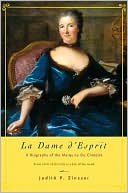Posted under Gender & conferences & women's history
 As in other history subfields, there is a great deal of contemporary interest in biography among women’s historians. At the Berkshire Conference on the History of Women this year, we have two panels, a workshop, and a seminar on women’s biography and feminist autobiography, with a total of 32 scholars presenting their work or commenting on the proceedings (program available here). When we announced that a seminar on women’s history and biography would be led by Judith Zinsser, co-author (with Bonnie Anderson) of the two-volume foundational work in European women’s history, A History of Their Own (1988, rev. 2000), and most recently the author of La Dame d’Esprit: A Biography of the Marquise du Chatelet (Viking/Penguin, 2006), we were deluged with applications. So, clearly biography is hot, and I expect that these sessions will attract throngs of other women’s historians who are working on biographies of their own.
As in other history subfields, there is a great deal of contemporary interest in biography among women’s historians. At the Berkshire Conference on the History of Women this year, we have two panels, a workshop, and a seminar on women’s biography and feminist autobiography, with a total of 32 scholars presenting their work or commenting on the proceedings (program available here). When we announced that a seminar on women’s history and biography would be led by Judith Zinsser, co-author (with Bonnie Anderson) of the two-volume foundational work in European women’s history, A History of Their Own (1988, rev. 2000), and most recently the author of La Dame d’Esprit: A Biography of the Marquise du Chatelet (Viking/Penguin, 2006), we were deluged with applications. So, clearly biography is hot, and I expect that these sessions will attract throngs of other women’s historians who are working on biographies of their own.
But, are women’s history and biography compatable genres? After all, biography is a genre of history that argues implicitly, if not explicitly, that men of action and vision are the great actors on history’s stage. (See for example this thread over at Edge of the American West asking for names of heretofore obscure people who have changed American history. When Historiann wrote in with women’s names, her suggestions were greeted by…a chorus of chirping crickets! There were other women’s names tossed in later, but all of them–Lucy Stone, Margaret Sanger, Rachel Carson, the Grimke sisters–have had at least one biographer, and their places are assured in the women’s history cannon.) So historians, who are prisoners of the text anyway, end up writing biographies of elite men who enjoyed the privilege of literacy, the time to record their thoughts in journals and letters, and the means to ensure that their papers didn’t end up lining shoes or at the bottom of a privy after their deaths. (This is especially true of biographies of people who lived before 1800, when the politics of American literacy guaranteed that very few female, brown, and/or working-class people had either the education or the time for writing.)
Zinsser is a pathbreaking scholar who has written frankly and compellingly about the challenges of feminist biography, and how the subjectivity of the author and her times inevitably and unavoidably influence her scholarship. She was a guest blogger over at the Penguin Group blog last month–click here to read her reflections on her life and the life of Emilie du Chatelet, the great mathematician, Enlightenment salonniere, and the translator of the authoritative French version of Newton’s Principia. (Zinsser’s book is now available in paperback as Emilie du Chatelet: Daring Genius of the Enlightenment, shown here.) Let us–Judith Zinsser and Historiann–know what you think in the comments. Does women’s history demand a reconceptualization of biography? Is there a difference between feminist biography and women’s biography? What are some of the best women’s biographies that you have read, and why do you think they were successful? If you are contemplating or writing a biography of a woman now, what are your challenges? How do literacy politics and power play into the period and region of the world you work in, and how do they shape your agenda as a scholar?








 Why I Teach (Early American) History:
Why I Teach (Early American) History: